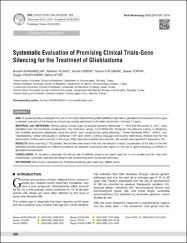Systematic evaluation of promising clinical trials-gene silencing for the treatment of glioblastoma

Göster/
Erişim
info:eu-repo/semantics/openAccessTarih
2019Yazar
Karaarslan, NumanYılmaz, İbrahim
Özbek, Hanefi
Çalışkan, Tezcan
Topuk, Savaş
Yaşar Şirin, Duygu
Ateş, Özkan
Üst veri
Tüm öğe kaydını gösterKünye
Karaarslan, N., Yılmaz, İ., Özbek, H., Çalışkan, T., Topuk, S. Yaşar Şirin, D. ve Ateş, Ö. (2019). Systematic evaluation of promising clinical trials-gene silencing for the treatment of glioblastoma. Turkish Neurosurgery, 29(3), 328-334. https://dx.doi.org/10.5137/1019-5149.JTN.22467-18.3Özet
AIM: To systematically investigate the role of artificial small interfering RNA (SiRNA) molecules in glioblastoma treatment and to give a detailed overview of the literature concerning studies performed in this field worldwide in the last 31 years. MATERIAL and METHODS: Articles about clinical trials conducted between December 1, 1949 and November 8, 2017, were identified from the Cochrane Collaboration, the Cochrane Library, Ovid MEDLINE, ProQuest, the National Library of Medicine, and PubMed electronic databases, using the terms "post transcriptional gene silencing," "small interfering RNA," "siRNA," and "glioblastoma," either individually or combined ("OR" and "AND"), without language and country restrictions. Articles that met the examination criteria were included in the study. After descriptive statistical evaluation, the results were reported in frequency (%). RESULTS: After scanning 2.752 articles, five articles were found that met the research criteria. Examination of full texts of the five identified articles provided no sufficient evidence for research conducted with regard to the use of gene silencing via siRNAs in glioblastoma treatment. CONCLUSION: To be able to evaluate the clinical use of siRNAs, there is an urgent need for in vivo studies and for trials with randomized, controlled, and clinical designs that provide long-term functional outcomes.
WoS Q Kategorisi
Q4Scopus Q Kategorisi
Q3Kaynak
Turkish NeurosurgeryCilt
29Sayı
3Bağlantı
https://dx.doi.org/10.5137/1019-5149.JTN.22467-18.3https://hdl.handle.net/20.500.12511/4008

















